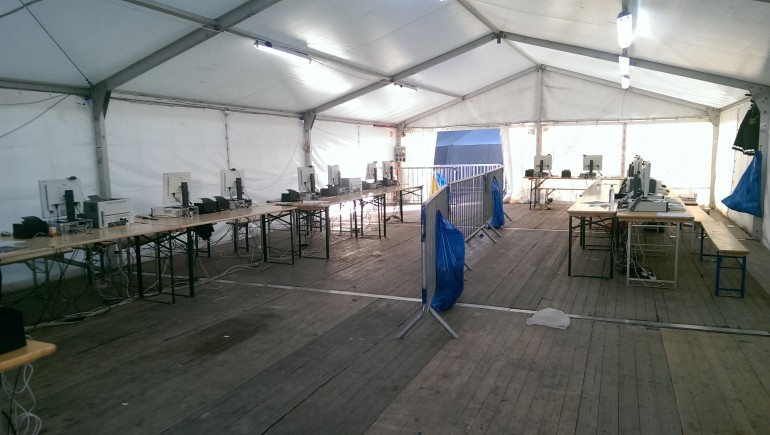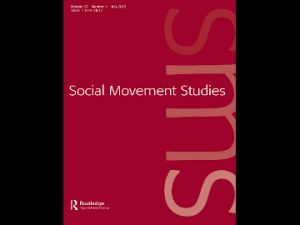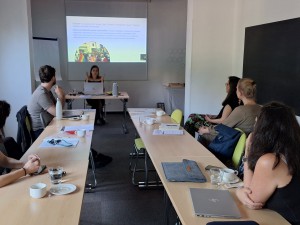Report from Dobova
29. 11. 2015 | Human Rights and Minorities, Politics

On Friday, November 27, we were in Dobova – Reception centre Livarna.
General observations:
Despite the cold weather, procedure in the reception centre remains the same – people receive food (in a bag) at the entrance, but they immediately have to stand in line for the registration where they wait for different amounts of time (those at the end of the line can wait for several hours). First the police do the security check and also check some people’s phones and then there is the registration, which is not always fully implemented (depends on the day). Only then refugees are sent to the tent where they can sit or lie down on the ground (there are only blankets available, with no benches, tables or beds there) and eat the food they got at the entrance of the centre.
Reception centre Livarna was renovated and it is now somewhat more suitable for winter conditions than before (e.g. asphalted ground, as there was macadam before), yet it is not suitable for retaining people for longer periods of time (although this has happened). There was supposed to be warm water for personal hygiene provided in the centre, but there are no washrooms or hot water yet. We noticed that there are still many people who arrive that are completely under-dressed and have completely torn shoes and detached soles; some are still in summer shoes, while others even wore shoes that were few sizes too small for them (they wore small sneakers as sandals) which made walking really difficult for them.
Until 3 pm that day, only one train arrived at 10.30 am with 1000 people; 540 people went to register at the reception centre Livarna, others were registered at the railway station. The police took only few people’s fingerprints in Livarna and they did not issue permissions to remain, but they took everyone’s photographs (we did not manage to get an explanation regarding changes in the procedure). The group that was registered at the railway station continued their way by buses through Karawanks ahead to Austria; the group of 540 people who were in Livarna from around 11 am went on for Jesenice by train. Afterwards the centre was empty until the arrival of the next train that evening.
Colleagues at the railway station ensured that families were not being separated, as we were searching for just one boy who was of age and we found him (his family also came to Livarna afterwards). The question is how the Red Cross RFL Unit works – there were only 2 people responsible for family reuniting that day and they were both at the railway station, while there were none in Livarna. Although there were no bigger issues that day, as there were just two trains expected throughout the day with a very small number of refugees compared to previous days, on any other day, when there were more refugees, there would not be enough volunteers in the RFL team. The UNHCR staff is really helpful regarding reuniting families and searching for family members.
Highlighted issues:
There were all 540 people in the reception centre Livarna after the registration and they had access only to first six toilets, while other toilets, which are on the other side of the centre, were not available. Those who were last to register and came to the tent last complained that all toilets are already dirty and asked as if they could use other toilets, but unfortunately this was not possible, as police had enclosed the tent so their movement was very limited. There was no access to running water, although there is running water available in the centre – but on the other side, where refugees are not allowed to go (there are fences in between). Further on, cold water, which is currently available in the centre, is not suitable for personal hygiene in winter conditions. There was a large amount of cleaning wipes available in the Red Cross tent/warehouse, however, we did not see them being distributed to the people.
Although it was a very “quiet” day and there was small number of refugees there, we noticed very poor coordination among humanitarian organizations in the reception centre regarding the division of work and giving directions to their volunteers (there was plenty of time to organize, since the reception centre was empty almost since 11 am). When first buses had already arrived, some volunteers still did not know what to do, saying they did not get any instructions. Some of the Red Cross volunteers distributed food, others were waiting for someone to tell them what to do. Eventually, it was suggested that some of the volunteers should distribute clothing, footwear and other things stored in the RC “warehouse” (e.g. baby food, diapers, wipes, pacifiers, powdered milk, etc.) which they happily embraced. We told them they should regularly go to the tent where police was sending refugees aftermthe registration, since they are not allowed to go to the Red Cross warehouse themselves. Some of the volunteers were not familiar with it, as they were probably there for the first time and nobody showed them the centre and the warehouse in detail and gave them work instructions. Some of the RC volunteers and eventually also the Slovene Philanthropy volunteers helped distributing clothes; the foreign volunteers, who joined through Hungarian Karitas (a foreign doctor helped them make the arrangement to even be allowed to work in the centre as volunteers), were especially welcome since they all spoke Arabic. Doctors and foreign volunteers who speak Arabic are of great help, since more translators are always needed, as there is not enough of them available (there are usually two translators in the reception centre Livarna – one for Arabic and one for Farsi language).
The system of distribution of clothes, diapers, baby food, milk, etc. is weak. If volunteers are not frequently visiting the refugee tent and checking the people’s needs, people do not have access to anything (while warehouses are full). As shown, if the coordinators do not explicitly give instructions and divide tasks, some volunteers do not recognize the needs of the refugees by themselves, i.e. there is a lack of self-initiative among vounteers. For example, nobody thought of distributing baby food (there was plenty of it) or powdered milk (there was enough for everyone) to babies in the tent with small children; there were also baby bottles, pacifiers, wet wipes and some other items in the warehouse. We showed it to some volunteers and suggested to take care about that especially, but we later noticed that nobody did that, as they were all distributing clothes and shoes, which was quite time-consuming (lot of time was spent on searching for certain items, as there were wrong sizes in the warehouse or there was no wanted items at all). There was certainly not enough volunteers to take care of all the people who needed something in relatively short period of time they spent in the centre (up to 3 hours).
There were some problems with escorting people to a doctor. Foreign volunteers who spoke Farsi intended to focus on the task, which made the most sense; however, they told us that the police did not allow them to escort refugees from the tent on the one side of the centre to the medical tent on the other side, saying that the doctor should come to them. The volunteers did not dare to insist, instead they told us about the problem. We were able to escort those in need without difficulties to the Hungarian Karitas tent where a volunteer doctor who spoke Arabic worked. She referred a younger man to the hospital and we arranged with the police for his brother to accompany him since they were traveling alone. They took care of him in the hospital so they returned in time to continue to Austria with the group.
In general, the police and the army conduct was proper, by some humane or even friendly, but still (it is seen on daily basis) some policemen and soldiers shout at people (aggressively, insulting) for no reason, when people do not even know what is expected and need only information or explanation. Let us give just one example: after the registration, the police instructed refugees to go to the tent; however, there were no translators there, so people could rely only on the officers’ gestures to know where to go; there was a fence at the entrance to the tent and there were a policeman and a soldier probably “guarding” it and making sure that everyone really went to the tent; volunteers and others, including us, were constantly moving the fence so we could go from the refugee tent to the Red Cross warehouse tent next to it; some of the refugees who asked for clothes or shoes thought they could go with us and as soon as they stepped out of the tent or approached the fence, they were shouted at. We also noticed that the others present (policemen or soldiers, including superior officers) whose conduct is completely different – proper – do not react to their colleagues’ inappropriate behavior.
Transportation of people from railway station to the reception facilities, which is a really short route, usually looks like this – police literally fills the buses with as many people as possible, even though buses with less passengers could run more frequently for such a short distance. There are people of different ages among the refugees, some are sick, tired or physically disabled and boarding overcrowded buses causes additional effort and stress for them. We do not see any reason for the police continue with such practice. Despite the fact they take care that families do not separate during boarding, some police officers still yell (and offensively shout) at people, thus creating unnecessarily stressful situation.
That day (like other days), we noticed the following problems with clothing, i.e. with supplies in the RC warehouse tent: there was a lack of all kinds of shoes – for children, women and especially men, there are no right sizes available and there is a significant amount of shoes which are not suitable for now (they are for warmer weather conditions); a suggestion for humanitarian organizations – inappropriate footwear should not be brought to the reception centre in first placa and they should be taken away now, since they are crowding the facility, and winter boots should again be actively collected; there was a lack of men’s and women’s trousers in different sizes, there were some useless men’s dress pants made from very light material and available only in extra large numbers; also, there was no socks (different sizes) or winter jackets, especially for men. The RC warehouse tent indeed seems well-stocked, but there are many useless items. It is necessary to organize the items and remove everything that is useless to make room for collecting new donations of WINTER shoes and clothes (especially jackets). Precisely now, when the daily number of arrivals is very low, there is enough time to organize the warehouse.
Given the temperatures are significantly low (and even colder days are expected), after the registration people started to spend more time on the inside of the tent than outside and we noticed that some started smoking in the tent (next to children, infants, sick). When we approached a refugee saying that he cannot smoke inside and that he should step outside, he threw the lit cigarette to the ground without putting it out. We requested that he immediately picks up the lit cigarette from the ground and takes it outside, considering there were blankets, clothes or bags all over the ground and something could easily burn. It is necessary to make signs in different languages saying it is forbidden to smoke in tents and to inform all volunteers to be aware of it and to warn people not to throw cigarette butts on the ground inside of the tent.




